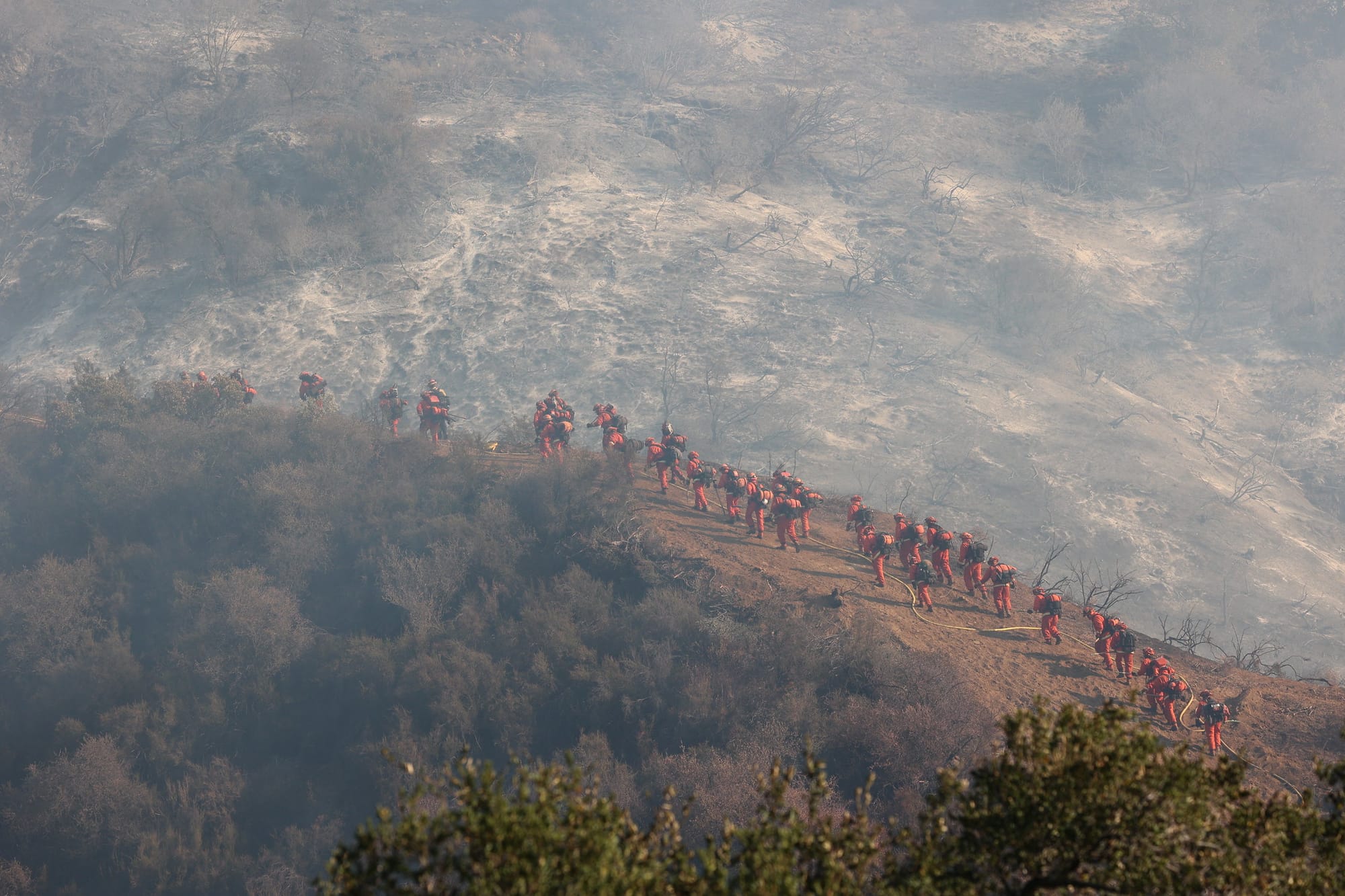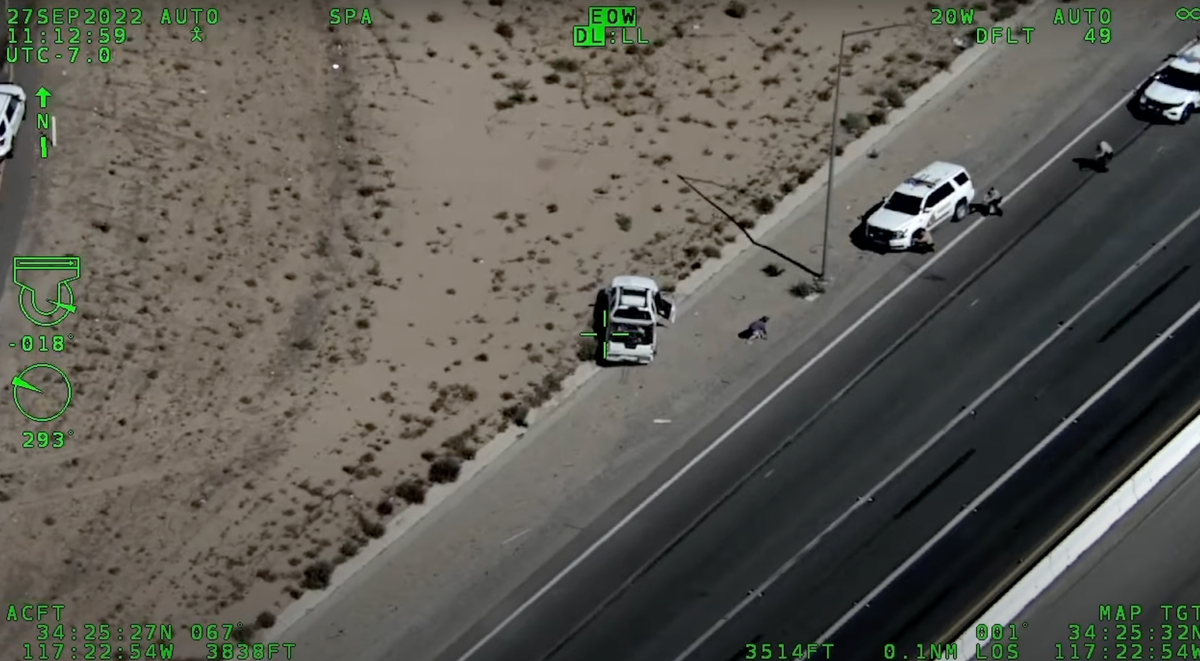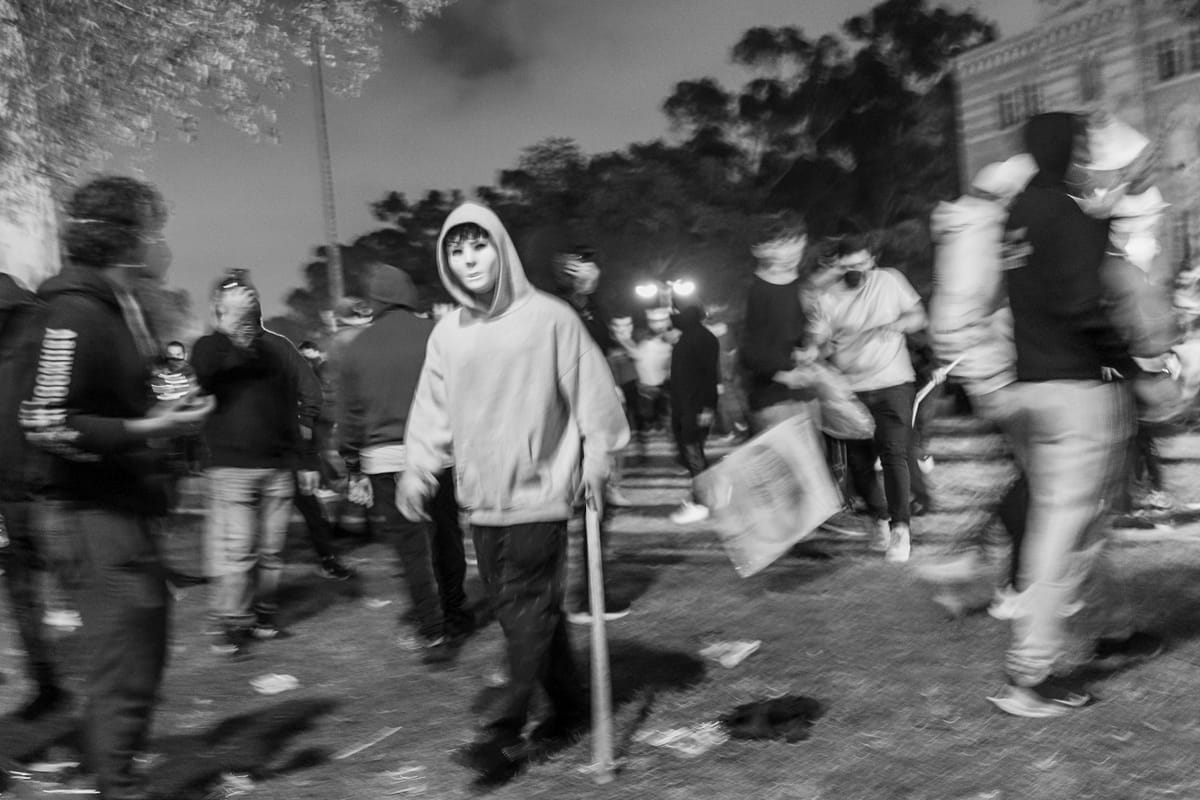The city has never felt smaller

There is a very small chance that you will be robbed or assaulted today by a random criminal. There is a near 100% chance you will be robbed or harmed today by a landlord or corporation or healthcare company or even the government.
Today Joey Scott writes about what it has been like in Los Angeles the past week.
Previously he wrote for Hell World about his effort to get the San Bernardino County Sheriff's Department to release footage of themselves killing a 15-year-old girl.

He also reported from UCLA as police and Zionist agitators attacked an anti-genocide encampment.

More from me after that.

The recovery hasn’t even begun
by Joey Scott
I couldn’t sleep. I spent last Tuesday night watching fires burn through the Pacific Palisades and Altadena to the east. I consumed the disaster in real time, switching between listening to scanners and watching news broadcasters on TV put microphones in the faces of fleeing families. The Watch Duty app flashed a fury of evacuation alerts to my phone. As I tried to report on the fires gusts of wind made my power flicker.
The 70 to 100 mph winds were hurling the fires at hurricane speeds through residential neighborhoods. The fire outrunning the firefighters meant home after home after church after grocery store was on fire before they could get to them. No amount of effort or water was going to stop or slow the flames.
The forecast for the winds later on into the night was only going to get worse. I worried about my partner’s family as the Eaton Fire crept further west towards their home. I worried about my friends and their families who had evacuated earlier in the day. Would they have homes when this was over? What would be gone when I woke up?
The following morning I checked my phone to see the fires had grown from 500 acres to over 2,000 acres overnight. It forced my partner’s family to evacuate at 4 am along with my friends who had to do the same throughout other parts of the city.
My apartment reeked of campfire despite the efforts of running my air purifiers at full blast into the night. The respirator I had to protect myself from tear gas covering the 2020 protests was repurposed to protect myself now from the air on dog walks.
Outside I watched large pieces of ash fall from the sky. Other bits and pieces of charred debris, the remnants of people’s belonging, swirled around with it. It accumulated in parts of the sidewalk where the wind gusts couldn’t get to them.
Describing the fires as apocalyptic or as an Armageddon feels too easy, too Biblical. It implies there is an end.
Wildfires are not unusual in Los Angeles. They sit among earthquakes and flooding in the ecology of natural disasters the city periodically experiences. But the fires have worsened each year. Thanks largely to climate change, there is no longer a fire season.
The lack of urgency to respond to climate change by the city, state, and federal government has consequences. It was barely mentioned by Kamala Harris during her failed run for president. It feels like it might be too late now.
Newly-elected Los Angeles County District Attorney Nathan Hochman stood on the ashes of his sister’s house to threaten harsh penalties for “looters.” LAPD Police Chief Jim McDonnell and Sheriff Robert Luna used their time in press conferences to do the same. It’s an example of the instinctual reaction of the police to make up justifications for their existence in the midst of disaster. It’s a belief there’s a latent criminality in people during tragedy. The cops can manifest a crime wave out of thin air.
But the real looters are behind the microphone.
It is LAPD and LASD’s billion-dollar budgets that grow every year at the expense of other city departments. The Los Angeles Controller Kenneth Mejia and Los Angeles Fire Chief Kristen Crowley are both on the record saying the city failed to adequately fund the fire department. The least the cops could do is pick up a hose or trash bag to help clean up. They aren’t busy at the moment. Maybe they can sell one of their 18 helicopters to get the firefighters functioning equipment.
Wildfires also haven’t stopped the looting and cruelty from happening elsewhere. As 20,000 become newly displaced, landlords are in court evicting people or price gouging rents to exploit those seeking shelter. Federal resources are being used by ICE and Border Patrol to arrest migrants throughout California. Providing no value for what we pay them, the LAPD and the city sweep unhoused people while ticketing and arresting them for living on the streets.
The federal government is also getting in on the looting, using billions in tax dollars to send weapons and money to materially support Israel’s genocide in Palestine. Fires from bombed refugee camps have blended in with videos of the wildfires. The horrors persist under the backdrop of disasters both natural and manmade.
My body was stuck in fight or flight mode when the neighborhood mutual aid Signal chat buzzed Wednesday morning. They were mobilizing to hand out water, food and masks later that afternoon. They asked if anyone wanted to join. Within minutes six of us were able to coordinate gathering food, water, tarps, and masks for our unhoused neighbors.
We weren’t the only ones. Mutual Aid LA was updating a Google Sheet in real-time full of resources for people to help. Mutual aid groups Ktown For All and LA Street Care drove around the city helping the unhoused, as they do every week. People opened their homes to foster displaced animals. Restaurants and businesses turned into hubs where people could get a meal or drop off supplies. The mayor’s office, in a rare acknowledgment of the mutual aid work in the city, asked for masks from Mask Bloc LA. Not to mention all of the ad-hoc community members who found ways to help or volunteer. Overnight a city with its massive sprawl has never felt smaller.
We are watching in real time a sputtering response to this disaster from the government. The failure is expected. Mutual aid is political but does not require politics. It is built with the understanding that we are on our own, but not alone. It is building a community with no regard for politics or expectations of repayment. It is, at a minimum, knowing your neighbor.
I thought of this passage from Rosecrans Baldwin’s book Everything Now: Lessons From The City-State of Los Angeles:
Aram Sagakian (general manager of LA’s City Emergency Management Department) encouraged people to get to know their neighbors and learn to care for them, if only out of self-interest. Community and social connectedness do not come with two-day delivery, he pointed out, and when the Big One hit, when fires stretched for blocks and the streets were ankle-deep in jagged glass, the 911 switchboard would be inundated with calls, and perhaps a child-care center somewhere would be on fire, with thirty kids trapped inside. Did anyone really think the city had enough resources to prioritize their problems in that case? "When there's a disaster, police and fire aren't first responders, they're second responders," he told me. "Make no mistake about that. First responders are a family member or a neighbor of yours."
It isn’t going to get better. At one point this week, eight fires encircled LA, even making their way up the Hollywood Hills before being extinguished. The Palisades Fire is up to 23,000 acres. The Eaton Fire is up to 14,000 acres. 10,000 buildings are likely destroyed. At least 25 people are dead. There is no rain in sight with more Santa Ana events expected in the coming days.
The recovery hasn’t even begun.
We’re in the midst of a poly crisis with another Trump presidency breathing down our necks. We can either lead from despair or hope. May the practice of care continue past this disaster, because the next one is around the corner.
Organizations need volunteers and money more than they need anything else right now. Mutual Aid LA is a great place to start. Consider these fundraisers for my friends, coworkers, and the mutual aid group I work with here and here or on Venmo @ Will_Lennon.
Please also donate some money here to the incarcerated firefighters, including incarcerated youth, who are being paid $5 to $10 a day to fight the fires. Type “firefighter fund” in the donation box.
Joey Scott is an independent investigative journalist and documentary photographer based in Los Angeles.
Paid subscribers can stick around for the best poems I read this week and the best new songs of the week and a very cool photo I saw and literally the funniest video I have seen in a long time and maybe something else I forget.


